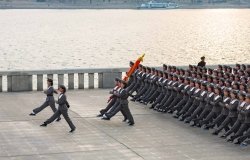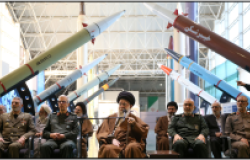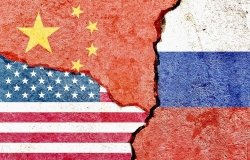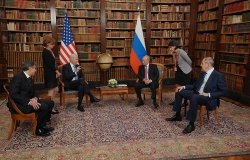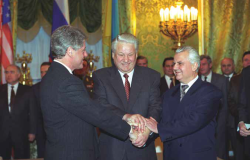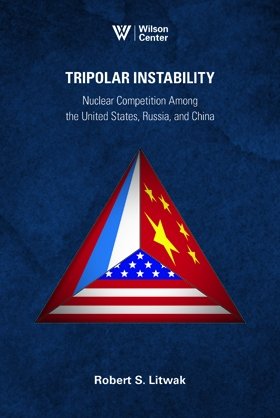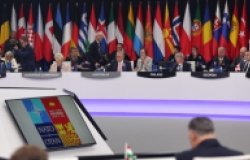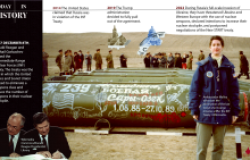Winter Games: What's Going On With North and South Korea?
The United States and North Korea are on a collision course over Pyongyang’s nuclear and missile programs. With North and South Korea seeming to have agreed to a truce in the run up to the Winter Games, uncertainty surrounds the fragile stability on the Korean Peninsula. Veteran Korea-watchers addressed these and related issues.
Overview
The United States and North Korea are on a collision course over Pyongyang’s nuclear and missile programs. With North and South Korea seeming to have agreed to a truce in the run up to the Winter Games, uncertainty surrounds the fragile stability on the Korean Peninsula. Will North Korea continue to restrain itself? Will Washington and Pyongyang find a way toward diplomacy? Will the US-ROK alliance fracture or remain whole? Veteran Korea-watchers addressed these and related issues.
Selected Quotes
Jane Harman
“Sports events are different from almost anything else. People get involved and excited, and this is an occasion, it seems to me, to create a thaw in the policy. Whether that will last, I don’t know but it is an occasion where the world will be tuned in, and let’s hope that good things come from this.”
“The recent actions of the Trump administration to increase sanctions on North [Korea] but also to increase—at least the statement of Rex Tillerson—to increase diplomacy, are…both welcome activities. I think if we can find a way to walk North Korea back and to enter into either a freeze-for-freeze or a step-for-step (which is a different version of de-escalation), I think both of those things would be welcome.”
Aaron David Miller
“I think it’s fair to say that politics and political agendas and terror have accompanied so many Olympics…but we now see it played out against something really quite extraordinary and complicated, perhaps the most fraught issue in the international system today: the challenge of North Korean nuclear weapons on the peninsula and the prospects of escalation.”
Abraham Denmark
“Broadly speaking, it seems that the United States wants to see North Korea refrain from conducting provocative acts. It’s unclear for how long; they’ve been deliberately ambiguous about how long of a pause North Korea needs to take, but there’s also indications that there needs to be a genuine expression or even demonstration of commitment to the denuclearization which of course Kim Jong Un has been unwilling to do.”
“The fact that human rights has been such a focus for the Trump administration and the fact that Pence is bringing along Otto Warmbier’s father suggests that their interests in engagement with North Koreans while in Korea is pretty low…there seems to be at least some possibility of engagement, but I think the chances of it are fairly low.”
“One of the key pieces to consider is, what is the objective of the Trump Administration? I don’t get a sense that their objective is to seem like the good guy necessarily, but rather to make sure everyone remembers North Korea is the bad guy. And they keep banging that drum in the face of North Korean propaganda. In terms of why they would meet with the North Koreans, I think there are two reasons: first is to demonstrate to Seoul but also to the Chinese and the Russians, that the United States is willing to talk…the second may be giving a genuine opportunity to engage. If there’s real concern that the United States may pursue a military option, that the President might decide that the military option is all that we have left, we would at least be able to say to ourselves, say to the American people say to the international community, ‘we tried diplomacy, we sat down with them, and they were not willing to move ahead.’”
Jean H. Lee
“This ongoing détente between the two Koreas is certainly making the Trump administration nervous. So while we have all this media frenzy in South Korea—as the cameras are chasing these cheerleaders and covering the North Koreans who frankly, have hijacked these opening [days]—we also have Vice President Pence threatening the toughest US sanctions ever on North Korea and vowing to counteract all this propaganda with a dose of reality about these human rights violations that North Korea is accused of.”
“I have to say, having watched all of this unfold from my perch in Seoul and having covered the North Korean athletes for the past 20 years, the mood is very different in South Korea. This is an Olympic moment—the Olympics are about unity and peace and support for diplomacy—but I have very different feelings personally about these events unfolding today as I did when I was in that stadium in Sydney in 2000 when the Koreans walked in together under a unified flag. So I do think we need to recognize that the situation is far different today than it was in 2000…and that we are, in South Korea, much more skeptical…”
“President Trump, when he was campaigning for the presidency, had said that he would be willing to sit down with Kim Jong Un. So he has planted the seed of that possibility in Kim Jong Un’s head, and I suspect that the North Koreans are also looking for an opportunity to gauge whether or not that’s a possibility. These types of summits would be a huge coup for Kim Jong Un; it would give him a huge amount of legitimacy if the leader of the United States were to sit down with him, face-to-face, one-on-one. That’s certainly something he would actually want, but that’s not something the US can give away so easily—even though there’s clearly an interest in seeing if that is a possibility down the road.”
J. James Kim
“I think overall, if you were to ask me how things will progress from this point on, I think things will remain calm on the peninsula until at least the end of March. That’s largely because after the Olympics you have the Paralympics coming, and there’s North Korean participation in the Paralympics as well…We will see if things will heat up again with the resumption of the joint exercise in April, and the key will be whether Washington decides to engage in talks with North Korea without putting conditions.”
“The general mood, overall, in South Korea is somewhat split about North Korea’s participation in the Olympics. There are some people that are very hopeful that this will be the stepping stone for more engagement and talks between the United States, South Korea and North Korea, but then there is another half of the population or a sizeable group that are somewhat disappointed about North Korean participation in the Olympics.”
“It seems the opposition is mainly coming from the older folks, 50s and over—both male and female. And the twenties and younger (male) in particular have been somewhat vocally expressing their opposition to the government’s announcement and having North Korea participate in the Olympics. This kind of public response is somewhat similar to the kind we saw in the past with South Korean public perception of North Korea and their perceptions of security matters. It’s not at all surprising that the younger males are coming out in opposition against the President. This has contributed to the somewhat recent decline in President Moon’s popularity among the general public.”
Speakers

Abraham Denmark

Jean H. Lee
Journalist and former Pyongyang Bureau Chief, Associated Press
J. James Kim
Moderator
Hosted By

Indo-Pacific Program
The Indo-Pacific Program promotes policy debate and intellectual discussions on US interests in the Asia-Pacific as well as political, economic, security, and social issues relating to the world’s most populous and economically dynamic region. Read more
Thank you for your interest in this event. Please send any feedback or questions to our Events staff.



